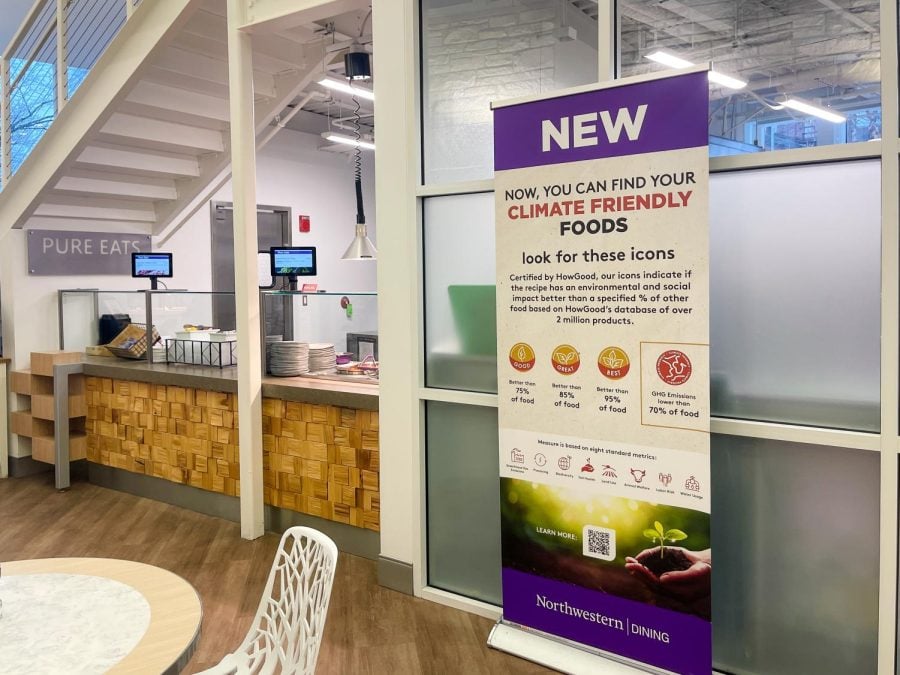HowGood is your food? Northwestern Dining implements sustainability ratings
Ava Mandoli/Daily Senior Staffer
The banners, accompanied by small icons on recipe cards that labeled food as “good,” “great” or “best,” were the result of NU Dining’s partnership with HowGood.
February 20, 2023
In Fall Quarter 2022, large banners appeared in Northwestern dining halls, offering students a new way to identify the most environmentally friendly foods.
The banners, accompanied by small icons on recipe cards that labeled food as “good,” “great” or “best,” were the result of NU Dining’s partnership with HowGood, an independent research organization that rates ingredients based on their impact on the natural and social environment.
As the largest database of product sustainability in the world, HowGood has reviewed more than 33,000 ingredients. The company rates foods based on eight criteria: greenhouse gas emissions, processing, biodiversity, soil health, land use, animal welfare, labor risk and water usage. A HowGood rating for each food averages its scores within each criterion, according to Eva Clark, director of marketing and communications at HowGood.
“You can make carbon reduction plans by sourcing different ingredients and not even know that by doing so, you’re using way more water, or you’re exploiting laborers,” Clark said.
HowGood partners with food service suppliers, retailers and organizations, like the Compass Group. Compass is the first and only university food service provider HowGood has worked with, but it plans to partner with more in the future, according to Clark.
NU Dining collaborated with sustainNU to implement HowGood ratings in dining halls. However, NU Dining has not set specific goals to offer more foods with higher HowGood ratings.
Instead, NU Dining’s goal is to spread awareness of the environmental and social impacts of different foods, according to Krista Brown, NU Dining’s sustainability and community engagement manager.
Brown said NU Dining’s approach is to encourage students to make more environmentally conscious and informed decisions when dining without limiting their options. She emphasized that university food providers have to accommodate the needs of all students who often come from different backgrounds.
“Dining halls have to cater to everyone,” Brown said. “Once you create all those options for everyone, how can you within those make the most sustainable choice?”
However, many students are not aware of what HowGood is or its role on campus.
Weinberg freshman Hunter Lee said the HowGood signs in the dining halls do not influence her dining decisions.
“I do remember being in Sargent and reading the sign and being like, ‘Oh, that’s pretty cool,’” Lee said. “But after that, I don’t think I ever really noticed it.”
Some students have also said there has not been enough communication from the University about the implementation of HowGood ratings or Compass’ sustainability efforts.
Cats Who Compost education Chair and Weinberg sophomore Quinn Correa said the student organization has struggled to establish consistent communication with the University about its food sourcing and waste management processes.
Correa said she used to be pescatarian, but she mostly eats NU’s vegetarian options due to her concerns about inconsistencies in how the University sources its ingredients.
Clark said achieving transparency throughout the entire supply chain, including ingredient sourcing, is incredibly difficult. She said ingredients frequently change hands, which makes it difficult to track their origins.
Weinberg freshman Silas Colombara said he rarely eats meat off campus because of sustainability concerns but doesn’t feel his dining choices on campus have as much impact on the environment.
“When I’m on campus, I’m already paying for it, so I feel like I don’t really know what the difference is between me eating it or not eating it,” Colombara said.
In response to students’ sentiment about having limited influence over the food dining halls provide, Clark said students are consumers, too, and the options they select impact which types of foods are provided.
Clark also emphasized the positive impact younger generations have had in calling for increased corporate transparency. When she began working at HowGood five years ago, she said the company had to spend half its pitch convincing companies to care about sustainability at all. Now, she said, companies care because consumers are demanding more accountability.
“What will drive service providers to change is consumer demand,” Clark said. “If the students in the dining hall are choosing the more sustainable meals, then the people making those meals will be making more sustainable options.”
Email: avamandoli2025@u.northwestern.edu
Twitter: @ava-mandoli
Related Stories:
— Northwestern dining halls to partake in plant-forward event on Stop Food Waste Day
— SustainNU prepares to release second 5-year Strategic Sustainability Plan in 2022
— NU students and faculty advocate for increased sustainability in campus buildings


